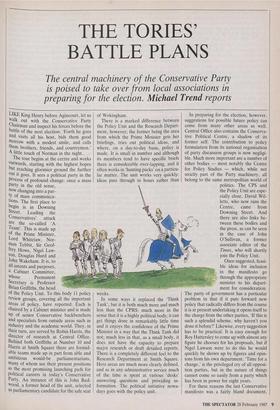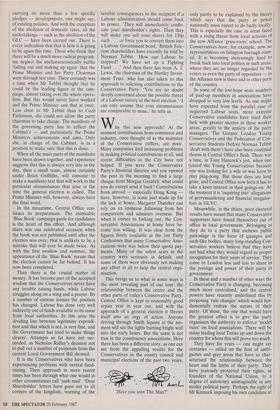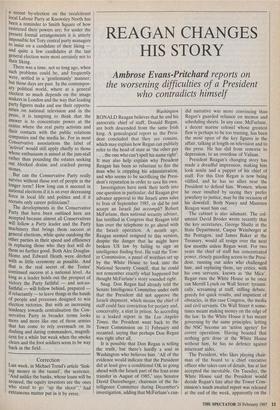THE TORIES' BATTLE PLANS
The central machinery of the Conservative Party is poised to take over from local associations in
LIKE King Henry before Agincourt, let us walk out with the Conservative Party Chairman and inspect his forces before the battle of the next election: 'Forth he goes and visits all his host, bids them good morrow with a modest smile, and calls them brothers, friends, and countrymen.' A little touch of Norman in the night.
Conservatives' attack are the so-called 'A Team'. This is made up of the Prime Minister, Lord Whitelaw, Nor- man Tebbit, Sir Geof- frey Howe, Nigel Law- son, Douglas Hurd and John Wakeham. It is, to all intents and purposes, a Cabinet Committee, whose Permanent Secretary is Professor Brian Griffiths, the head of the Policy Unit. To this body 11 policy review groups, covering all the important areas of policy, have reported. Each is chaired by a Cabinet minister and is made up of senior Conservative backbenchers and specialists from outside areas such as industry and the academic world. They, in their turn, are served by Robin Harris, the director of research at Central Office. Behind both Griffiths at Number 10 and Harris at Smith Square there are formid- able teams made up in part from able and ambitious would-be parliamentarians, many of whom see their present positions as the most promising launching pads for political careers in today's Conservative Party. An instance of this is John Red- wood, a former head of the unit, selected as parliamentary candidate for the safe seat of Wokingham. There is a marked difference between the Policy Unit and the Research Depart- ment, however; the former being the area from which the Prime Minister gets her briefings, tries out political ideas, and where, on a day-to-day basis, policy is made. It is small in number and although its members tend to have specific briefs there is considerable over-lapping, and it often works in 'hunting packs' on a particu- lar matter. The unit works very quickly: ideas pass through in hours rather than weeks.
In some ways it replaced the 'Think Tank'; but it is both much more and much less than the CPRS: much more in the sense that it is a highly political body; it can get things done in remarkably little time and it enjoys the confidence of the Prime Minister in a way that the Think Tank did not; much less in that, as a small body, it does not have the capacity to prepare major research or draft detailed reports. There is a completely different feel to the Research Department at Smith Square. Here areas are much more clearly defined, and as in any administrative service much of the time is spent at various 'desks' answering questions and providing in- formation. The political initiative nowa- days goes with the policy unit. Once suggested, feasi- ble ideas for inclusion in the manifesto go through the appropriate minister to his depart- ment for consideration. The party of government has a particular problem in that if it puts forward new policy that radically differs from the course it is at present undertaking it opens itself to the charge from the other parties, 'If this is such a splendid scheme, why haven't you done it before?' Likewise, every suggestion has to be practical. It is easy enough for Roy Hattersley to come up with almost any figure he chooses for his 'proposals, but if Nigel Lawson were to do this he would quickly be shown up by figures and opin- ions from his own department. 'Time for a change,' is the privileged cry of all opposi- tion parties, but in the nature of things cannot come so easily from a party which has been in power for eight years.
For these reasons the last Conservative manifesto was a fairly bland document, carrying no more than a few specific pledges — developments, one might say, of existing policies. And with the exception of the abolition of domestic rates, all the undertakings — such as the abolition of the GLC — have been carried out. There is every indication that that is how it is going to be again this time. Those who think that there will be a much more radical program- me neglect the uncharacteristically public `falling out and making up again' that the Prime Minister and her Party Chairman went through last year. There certainly was a time when Mr Tebbit thought that he could be the leading figure in the cam- paign, almost taking over the whole opera- tion. But this would never have worked and the Prime Minister saw that at once. Less close to Mr Tebbit than to Cecil Parkinson, she could not allow the party chairman to take charge. The manifesto of the governing party has to reflect the Cabinet's — and particularly the Prime Ministers achievements and aims. Only she, in charge of the Cabinet, is in a position to make sure that this is done.
When all the main parts of the manifesto have been drawn together, and experience suggests that this is always very late in the day, then a small team, almost certainly under Brian Griffiths, will convene to make a manifesto text that will work in the particular circumstances that arise at the time the general election is called. The Prime Minister will, however, always have the final word.
In the meantime, Central Office con- tinues its preparations. The inimitable `Blue Book' campaign guide for candidates is the heart of this effort. And although there was one celebrated occasion when the book was not published until after the election was over, that is unlikely to be a mistake that will ever be made twice. As with the first swallow and summer, the appearance of the 'Blue Book' means that the election cannot be far behind. It has now been completed.
Then there is the crucial matter of money. It has become part of the accepted wisdom that the Conservatives never have any trouble raising funds, while Labour struggles along on a wing and a prayer. By a number of curious ironies the position has changed. Labour has done very well indirectly out of funds available to its cause from local authorities. In this area the dividing line between legitimate expendi- ture and that which is not, is very fine, and the Government has tried to make things clearer. Attempts so far have not suc- ceeded, as Nicholas Ridley's decision not to pull out a number of proposals from the current Local Government Bill showed.
It is the Conservatives who have been experiencing problems with central fund- raising. Their approach in more recent times has been through what one would in other circumstances call 'junk mail'. 'Dear Shareholder' letters have gone out to all corners of the kingdom, warning of the terrible consequences to the recipient if a Labour administration should come back to power. 'They will immediately confis- cate your shareholder's rights. Then they will make you sell your shares for 130p each . . . or force you to convert them into a Labour Government bond,' British Tele- com shareholders have recently be told by Norman Tebbit. 'How can Labour be stopped? We have set up a Fighting Fund . . .' And then there has been A. J. Lewis, the chairman of the Hartley Invest- ment Trust, who has also taken to this approach in soliciting contributions to the Conservative Party: 'You are no doubt deeply concerned about the possible threat of a Labour victory at the next election.' 'I can only assume that your circumstances are comparable to mine,' he tells us.
Why this new approach? At the moment contributions from commerce and industry, once thought of as the mainstay of the Conservative coffers, are poor. Many companies find increasing problems in making political contributions at all, and recent difficulties in the City have not helped. If you were the Conservative Party's financial director and you opened the post in the morning to find a large cheque from Morgan Grenfell, what could you do except send it back? Contributions from abroad — especially Hong Kong have, however, in some part made up for the lack at home. Margaret Thatcher can rely on an immense following from her compatriots and admirers overseas. But when it comes to forking out, the Con- servative Associations at home have be- come less willing. It was clear from the figures freely available at the last Party Conference that many Conservative Asso- ciations were way below their quota pay- ments. Many of the safest seats in the country were seriously in default, and some of them were obviously not making any effort at all to help the central orga- nisation.
This brings us to what in some ways is the most revealing part of our tour: the relationship between the centre and the other parts of today's Conservative Party. Central Office is kept in reasonably good repair year in year out, and with the approach of a general election it throws itself into an orgy of action. Anyone driving through Smith Square at the mo- ment will see the lights burning bright well into the early hours. But the same is not true in the constituency associations. Here there has been a different story, as one can see from the appalling results for the Conservatives in the county council and municipal elections of the past two years,
Have you seen The Man?'
only partly to be explained by the theory which says that the party in power nationally must expect to do badly locally. This is especially the case in areas faced with a rising threat from local activists of the new Alliance 'grass-roots' school. The Conservatives have, for example, now no representatives on Islington borough coun- cil. It is becoming increasingly hard to break back into local politics in such areas, where they are no longer regarded by the voters as even the party of opposition — as the Alliance now is there and in other parts of the country.
In some of the lost-hope seats numbers of paid-up members in associations have dropped to very low levels. As one might have expected from the parallel case of neglected Labour seats, more extreme Conservative candidates have tried their luck with greater success in these weaker areas, greatly to the anxiety of the party managers. The Greater London Young Conservatives and the Federation of Con- servative Students (before Norman Tebbit `dealt with them') have also been continual thorns in Central Office's flesh. There was a time, in Tony Hancock's jest, when one • joined the Young Conservatives because one was looking for a wife or was keen to play ping-pong. But those days are long gone, and Central Office now feels it has to take a keen interest in their goings-on. At the moment it is 'inquiring into' allegations of gerrymandering and financial irregular- ities in GLYC.
Meanwhile, in the shires, poor electoral results have meant that many Conservative supporters have found themselves out of office in local government. Belonging as they do to a party that eschews public patronage in the form of quangos and such-like bodies, many long-standing Con- servative workers believe that they have not had what they would regard as proper recognition for their years of service. They come to London less and less to share in the prestige and power of their party in government.
In these and a number of other ways the Conservative Party is changing, becoming much more centralised, and the central powers have recently underlined this by proposing 'rule changes' which would fun- damentally redraw the nature of their party. Of these, the one that would have the greatest effect is to give the party organisers the authority to enforce 'model rules' on local associations. There will be many leading local Tories up and down the country for whom this will prove too much.
They have for years — one might say centuries — relied on the host of ambi- guities and grey areas that have so char- acterised the relationship between the heart and the limbs of their party. They have jealously protected their rights, as founders of the National Union, to a degree of autonomy unimaginable in any moder political party. Perhaps the sight of Mr Kinnock imposing his own candidate at a recent by-election on the recalcitrant local Labour Party at Knowsley North has been a reminder to Smith Square of how restricted their powers are; for under the present formal arrangements it is utterly impossible for Tory central party managers to insist on a candidate of their liking and quite a few candidates at the last general election were most certainly not to their liking. There was a time, not so long ago, when such problems could be, and frequently were, settled in a 'gentlemanly' manner; but those days are past. In the contempor- ary political world, where at a general election so much depends on the image makers in London and the way that leading party figures make and use their opportu- nities on national television and in the press, it is tempting to think that the answer is to concentrate power at the centre where the real party activists and their contacts with the public relations Companies and the media lie. For in most Conservative associations the label of activist' would still apply chiefly to those whose enthusiasm is aimed at the jam-stall rather than pounding the estates seeking out blocked drains and cracked paving stones.
But can the Conservative Party really survive without these sort of people in the longer term? How long can it succeed in national elections if it is an ever decreasing force in local life and politics and if it recruits only career politicians? The developments in the Conservative Party that have been outlined here are accepted because almost all Conservatives will follow a Party leader and the Party machinery that brings them success at general elections, while quite outdoing the other parties in their speed and efficiency In replacing those who they feel will do them no further good. Both Alec Douglas- Home and Edward Heath were ditched with as little ceremony as possible. And that is the real secret of the Tories' continued success at a national level. As long as a leader holds out the prospect of victory the Party faithful — and not-so- faithful — will follow behind, prepared if reluctantly — to leave things in the hands of people and processes designed to win election victories. But with an increasing tendency towards centralisation the Con- servative Party in broader terms looks more and more like one of those armies that has come to rely overmuch on its dashing and daring commanders, magnifi- cent for a while but weak when the smoke clears and the foot soldiers seem to be way back in the field.




















































 Previous page
Previous page